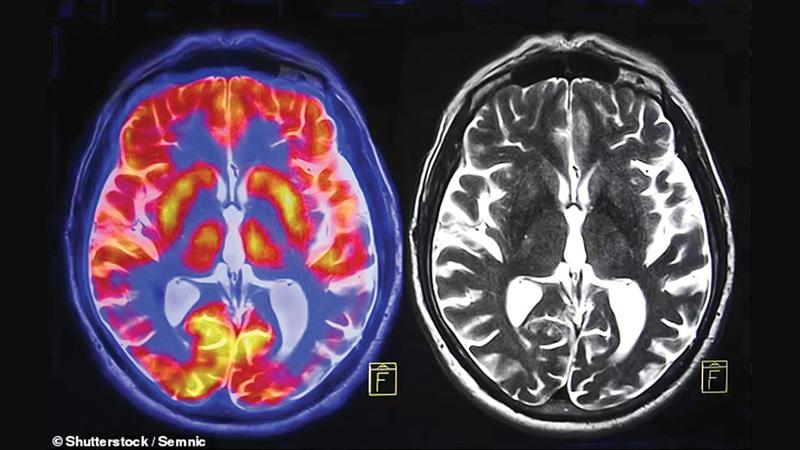
Losing our memory, our sense of self and identity sounds like a living nightmare. And for many people suffering with Alzheimer’s and other forms of dementia, it is.
But how can you tell if you or a loved one is experiencing the early stages of Alzheimers?
Forgetfulness is common, particularly as we get older. Who hasn’t struggled to remember someone’s name?
And walking into a room with no memory of what you walked in for is another all-too common experience. Although disorientating, and sometimes worrying, these lapses in memory aren’t usually anything to worry about.
‘Our brains start ageing from our early 20s,’ says Prof. Hana Burianova, a neuroscientist at Bournemouth University and advisor for British supplement brand Healthspan.
‘Once they stop developing, they begin to age, which means it’s losing connections between different parts.
However, the brain is plastic and if we’re active and social, if we exercise and eat a healthy diet we can make new connections right up until old age.
‘But when the brain is pathologically ageing, the neurons - which transmit messages to other parts of the brain - are dying. This neuron death is what happens with Alzheimers.’
So what are the memory and behaviour changes that are cause for concern? Prof. Burianova reveals the tell-tale signs you should never ignore.
Forgetfulness
One of the hallmarks of early Alzheimer’s is loss of memory. But how can you tell if an older loved one is being scatty or there’s something more concerning at work?
‘We know from research that older adults, aged 65-plus, will lose some detail in autobiographical memory, but their memory for facts and words is better than younger people,’ says Prof. Burianova.
And often much of the typical ‘forgetfulness’ of otherwise healthy older people might be because they’re not paying attention in the first place.
‘They may not be “encoding” the information, for instance perhaps they were told a story at a party but they were distracted,’ she says.
‘The difference between a brain that’s ageing healthily, and pathological degeneration is the progressive dying of neurons. The changes will occur gradually.’
The death of these neurons typically takes place in the parts of the brain involved in memory such as the entorhinal cortex and hippocampus.
Someone will forget conversations they just had, or they may get lost somewhere they know well, or forget the route home, despite doing it countless times before.
‘Anyone can forget to turn off the stove, but with someone with Alzheimer’s, it keeps happening,’ she says.
Repeating themselves
Most of us are all too familiar with loved ones who’ve been telling the same stories for years.
However, unlike Aunt Mary relating the tale about the nice neighbour who came to trim her hedges whenever you visit, someone with Alzheimer’s will repeat the same information over and over again often in a short space of time.
‘We all tell stories several times, especially to our partners. There might be a cue that reminds us, and that’s the trigger for our retrieval,’ says Prof. Burianova.
‘But someone with Alzheimer’s will repeat something three times in a row. It’s a symptom of their short term memory loss.’
Sudden changes in mood
If your otherwise level loved one suddenly becomes anxious or depressed, it could be more than a mid-life crisis.
‘Early signs of frontotemporal dementia (FTD), which Bruce Willis has, include changes in personality. It’s very hard as people get depressed and anxious,’ says Prof. Burianova.
‘Someone will try to find out why their beloved is suffering from mental health issues, but it’s more than that - it’s because part of the brain is deteriorating.
‘Picture the brain as a big net and part of the net starts being broken, then the rest of the net starts to rip. Depending on where that process starts, it will govern the symptoms.
‘FTD has secondary symptoms like memory loss and physiological issues such as bowel problems.’ -Daily Mail.co.uk
